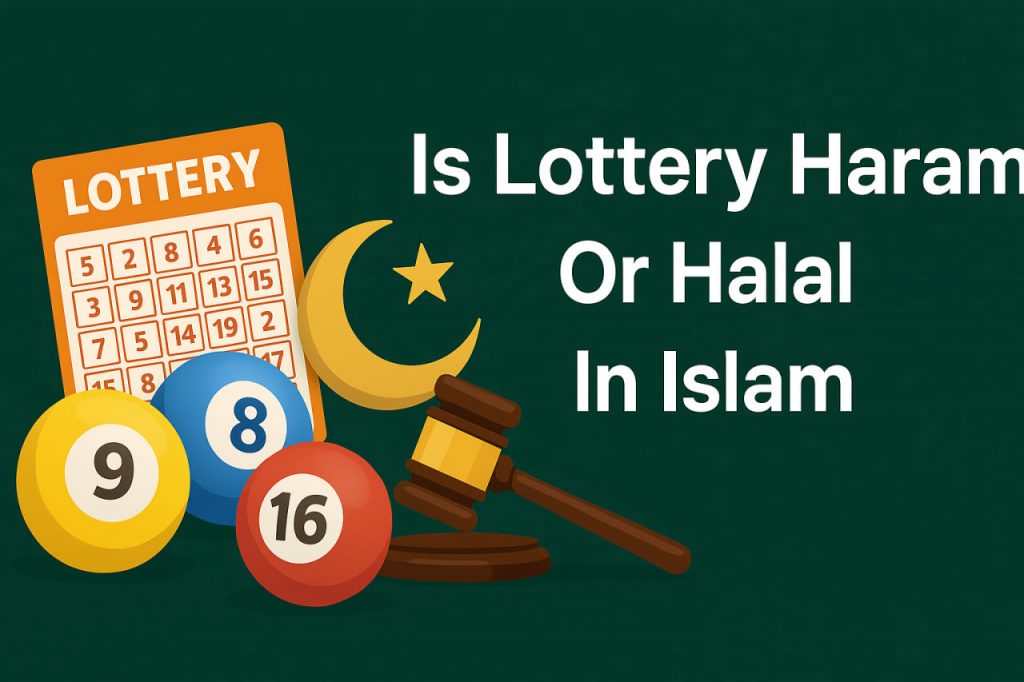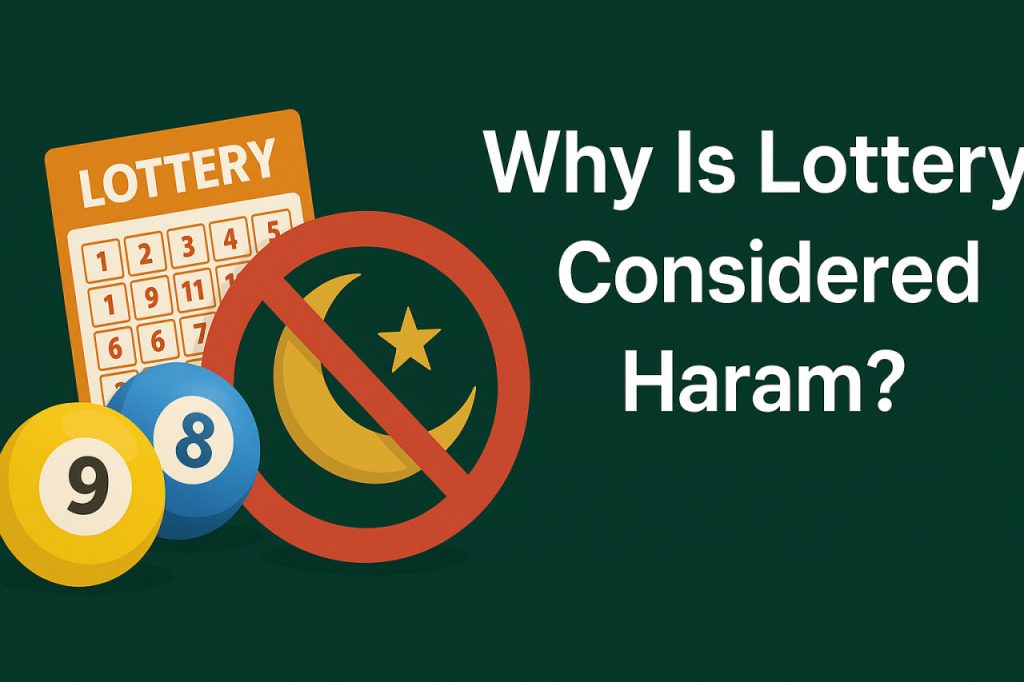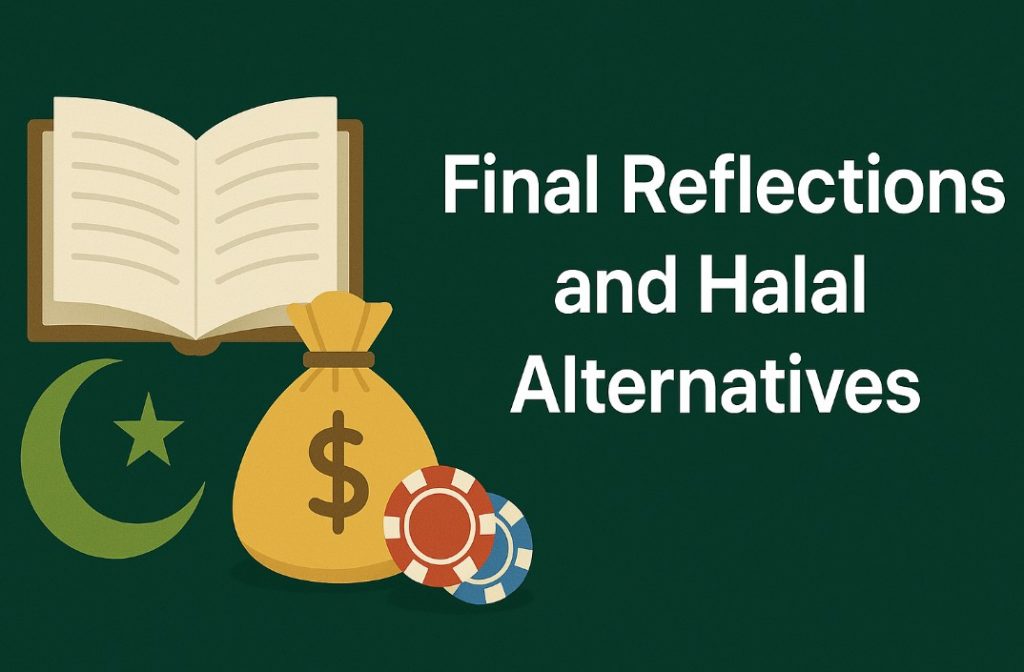Is Lottery Haram or Halal in Islam?

The question of whether the lottery in Islam is halal or haram is a matter that many Muslims seek clarity on. With the rise of online lotteries, national lottery schemes, crypto-based raffles, and mobile-based scratch cards around the world, understanding the Islamic perspective on this issue is more important than ever. As people explore different means of income or recreational activities, it’s crucial to reflect on whether these methods align with Islamic principles. Islam provides a comprehensive ethical and legal framework to guide believers in every aspect of life, including financial transactions and entertainment. Many Muslims want to ensure their sources of income and enjoyment do not violate the boundaries set by Allah (SWT). This article offers a detailed exploration of the concept of lotteries in Islam, referencing Quranic verses, Hadiths, scholarly interpretations, and practical considerations to definitively answer the common question: Is lottery haram or halal in Islam?
Understanding What a Lottery Is
A lottery is a system in which individuals pay money, buy tickets, or register for a chance to win a prize, which may include cash, vehicles, electronics, vacations, or even property. The winner is usually selected through a random draw. In modern times, lotteries are often operated by governments or licensed companies and are advertised widely. Lotteries may be presented as harmless fun or even as charitable fundraising tools, but their core structure and implications reveal deeper ethical concerns.
Key Characteristics of a Lottery:
- Payment or stake required to participate: A financial cost is associated with entering the draw. Even a minimal fee counts as a stake in Islamic jurisprudence.
- Randomness and lack of skill: The selection of winners is entirely based on chance, with no skill or merit involved.
- Disproportionate risk-to-reward ratio: Many pay, but only a few win. The financial risk is carried by the majority.
- No intrinsic value exchange: Participants contribute nothing productive to win; the game does not involve mutual benefit or lawful trade.
- Mass appeal through advertising: Lottery campaigns often exploit emotions and dreams, especially targeting lower-income communities.
Lotteries appeal to human desires for wealth and a better life. They often promise the illusion of overnight success, feeding into emotional vulnerabilities and aspirations. But from an Islamic lens, the structure and consequences must be analyzed under Shariah principles.
What Does Islam Say About Gambling?
Islamic teachings strictly prohibit gambling. In Arabic, the term for gambling is “Maisir”, and it is considered a major sin. Gambling is seen as unjust, exploitative, and spiritually harmful.
Quranic Evidence:
“O you who have believed, indeed, intoxicants, gambling, [sacrificing on] stone alters [to other than Allah], and divining arrows are but defilement from the work of Satan, so avoid it that you may be successful.”
(Surah Al-Ma’idah 5:90)
This verse explicitly categorizes gambling as unclean and links it with other grave prohibitions like idolatry and alcohol. The command to “avoid it” is clear and absolute, leaving no ambiguity.
“Satan only wants to cause between you animosity and hatred through intoxicants and gambling and to avert you from the remembrance of Allah and from prayer. So will you not desist?”
(Surah Al-Ma’idah 5:91)
This follow-up verse explains the harmful consequences of gambling—social discord, spiritual distraction, and alienation from worship.
Prophetic Traditions (Hadith):
- The Prophet Muhammad (peace be upon him) said: “Whoever says to his companion, ‘Let us gamble,’ must give in charity as an expiation.” (Sahih Bukhari)
Even the intention or suggestion of gambling is considered sinful. Islam teaches that believers should avoid not only sinful actions but also behaviors that lead to or resemble sin.
Play Halal-Approved Lottery Selected by Our Team
Most lottery games are clearly haram in Islam because they involve buying tickets, betting on random numbers and hoping to win large cash prizes through pure chance. Our team has carefully reviewed different lottery-style experiences and selected a Shariah-verified alternative that removes the gambling elements while keeping the number-based gameplay.
This halal lottery-style option is designed for Muslims who want a safe, educational and risk-free experience, with no real-money stakes or cash jackpots involved.
- ✔ Lottery-style game reviewed and Shariah-checked
- ✔ No ticket purchases, no betting, no money prizes
- ✔ A halal-conscious way to enjoy lottery-style number games
Note: This halal lottery recommendation is based on our team’s Shariah analysis and is provided for educational purposes only. For personal religious rulings, please consult a qualified Islamic scholar.
Why Is Lottery Considered Haram?

There are several Islamic legal and ethical reasons why the lottery is considered haram:
| Reason | Explanation |
|---|---|
| Gharar (Uncertainty) | The outcome is unpredictable. Islam forbids excessive uncertainty in contracts. |
| Maisir (Gambling) | The essence of a lottery is betting money for a chance to win more, which is gambling. |
| Unjust Enrichment | Winners gain large sums without effort; others lose, creating inequality and injustice. |
| Waste of Wealth | Resources are spent on hope rather than on productive or charitable causes. |
| Exploitation of the Vulnerable | Poor communities are often targeted by lottery marketing, leading to further financial hardship. |
| Desensitization to Risk | Encourages a mindset of quick gain rather than ethical labor and patience. |
| Spiritual Damage | Distracts from remembrance of Allah and reliance on lawful earnings. |
| Psychological Harm | Can cause anxiety, addiction, disappointment, and financial stress. |
In short, lotteries embody multiple elements that contradict the principles of justice, ethics, and social responsibility in Islam. They provide no real value, foster unhealthy habits, and shift the focus from effort to luck.
Scholarly Consensus on Lottery in Islam
Mainstream Scholarly View:
Scholars from all four major Sunni schools—Hanafi, Maliki, Shafi’i, and Hanbali—are unanimous in declaring lotteries haram. Their conclusion is based on:
- Direct verses from the Quran prohibiting gambling.
- Analogies drawn from traditional forms of games of chance.
- The ethical principle of promoting fairness, responsibility, and transparency in society.
Exceptions & Contemporary Debates:
Some scholars have discussed cases where a lottery does not involve direct loss (e.g., free prize draws) or when the proceeds are used for charitable causes. However, even in these situations, scholars warn:
- The source of funding must be halal.
- There must be no payment, direct or indirect, for entry.
- The promotional or commercial nature should not deceive or manipulate participants.
Such cases are rare, and most scholars advise caution or avoidance due to the risk of normalizing gambling behavior.
Modern Examples and Islamic Judgement
| Type of Lottery | Description | Islamic Verdict |
| Government Lottery | Funded by public ticket sales | Haram |
| Charity Raffle | Ticket-based fundraiser | Haram (majority view) |
| Free Entry Contest | No payment involved | Permissible (with conditions) |
| Retail Giveaway | Entry via purchase | Makruh/Haram depending on setup |
| Online Lottery Apps | Random draws with fees | Haram |
| Crypto Lotteries | Gambling with digital tokens | Haram |
Even technological innovation cannot change the fundamental nature of gambling. If chance and money are involved, it remains impermissible.
Conclusion: Is Playing the Lottery Halal or Haram?
Based on a thorough examination of Islamic texts, scholarly opinion, and ethical reasoning, the answer to the question “Is lottery haram or halal in Islam?” is clear:
The lottery is haram in Islam.
Whether played for entertainment, financial hope, or charity, the lottery involves elements of chance, loss, and unethical gain. It is a form of modern gambling that contradicts the values of accountability, effort, and lawful income. Participating in or supporting such systems undermines both individual spirituality and the health of society.
Muslims are called to earn through halal means, trust in Allah’s provision, and build a life grounded in sincerity, patience, and faith.
Final Reflections and Halal Alternatives

Choosing halal income sources is a test and a blessing. Allah provides barakah (blessing) in lawful wealth, even if small. Avoiding doubtful or impermissible paths ensures a clean heart and peaceful mind.
Halal Alternatives to Lotteries:
- Halal Investing: Use Islamic mutual funds or stocks screened for Shariah compliance.
- Entrepreneurship: Start a small, value-driven business.
- Savings Plans: Budget and save over time instead of seeking shortcuts.
- Islamic Banking: Use savings and investment accounts certified by Islamic scholars.
- Zakat & Sadaqah: Give and support others, attracting divine blessings.
- Skill Development: Invest in education and self-improvement to increase earning potential.
A halal lifestyle brings long-term peace, dignity, and reward—both in this world and the hereafter.

User Reviews
I always knew normal lottery is haram, but I still liked number games. This site helped me find a Shariah-checked lottery-style option with no money and no gambling. It feels good to finally have a halal alternative.
Your explanation about why typical lotteries are prohibited was very clear. The halal lottery-style game you recommend is safe and fun, and it doesn’t involve any tickets or cash prizes. Great work for the Muslim community.
I’m really thankful for this website. It helped me stay away from national lottery tickets and instead choose a Shariah-verified, risk-free option. Very useful for Muslims trying to avoid gambling completely.
I didn’t think there could be anything “lottery style” that is still halal, but the alternative suggested here really changed my mind. It keeps the number guessing fun without any haram elements. Jazakum Allahu khayran.